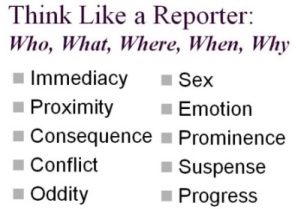|
by
Steven R. Van Hook, PhD
Publisher, HowToMarketing.us
 This
is a follow-up article to an earlier piece on
crafting
media releases. This
is a follow-up article to an earlier piece on
crafting
media releases.
Once you've honed the
perfect release comes the even greater challenge of sparking some media
interest in it.
Keep in mind you are
not just pitching your release to reporters, but to the fussy editors they
report to, and to the still pickier publics they all serve.
As you start your pitch
to the press, keep in mind some distinct media types and how you might
modify your delivery:
Print Media: newspapers
and magazines may go deep into your story as a news feature. Be prepared
with data, several sources for quotes, company profiles, and other such
detail.
Television:
it's a very
visual medium; some call it
pictures with words. Attractive
action-packed video might include kids running about, and water of some
sort can provide an appealing backdrop.
Radio: it's the
right-now medium, for fast-breaking events. An old saw says, 'If you hear
it, it's news. If you read it, it's history.'
Internet:
reaching a
global audience as fast as a 'send' command. If your story is picked up,
most media can get you play on their websites as well.
Consider that
appeals
attracting attention in the marketplace can also be effective eye-grabbers
in the media as well.
And recall the sorts of
story angles you should consider while drafting your media release can
fortify your media pitch:

If after all your efforts preparing
and pitching your release you are fortunate enough to land an interview,
there are some important items to keep in mind:
-
Understand it is not the media's
job to make you look good -- in fact, they may score more points for
reporting something bad about you. Remember the enduring news slogan,
'if it bleeds, it leads.'
-
A reporter is under considerable
limits. An editor often decides if or when a story will run and what
news hook it will have, not the reporter. Reporters are typically
rushed with little time to folllow-up on facts or quotes. They most
certainly won't give you an advance look at a piece.
-
Be prepared for any question --
especially one you'd least likely want to answer.
-
Mistakes and misquotes occur, and
unless it is central to your message, don't worry too much about it.
As they say, don't argue with anyone who buys ink by the barrel.
-
Don't expect too much from any one
news report -- even if it goes national or global. Best results happen over the long haul, not
by any one story.
You can find lots of tips
for pitching to the media by professionals who do this for a living with free articles on
media relations.
Be sure to watch the video
below to see more ideas on dealing with the media.
Media Relations
You can find more
articles on fundamentals of marketing and communications on pages here,
and on our sister website
HowToMarketing.us
And visit our YouTube video libraries on
Communications & Business, and
Personal Development.
Steven
Van Hook
has
taught MBA and undergraduate public relations, marketing,
and
communications courses for colleges and universities in the
United States and abroad for more than a decade.
http://howtomarketing.us
More
Articles | Submit
Your Article | PR
Subjects
About
Public Relations Homepage
Contact Us
|

